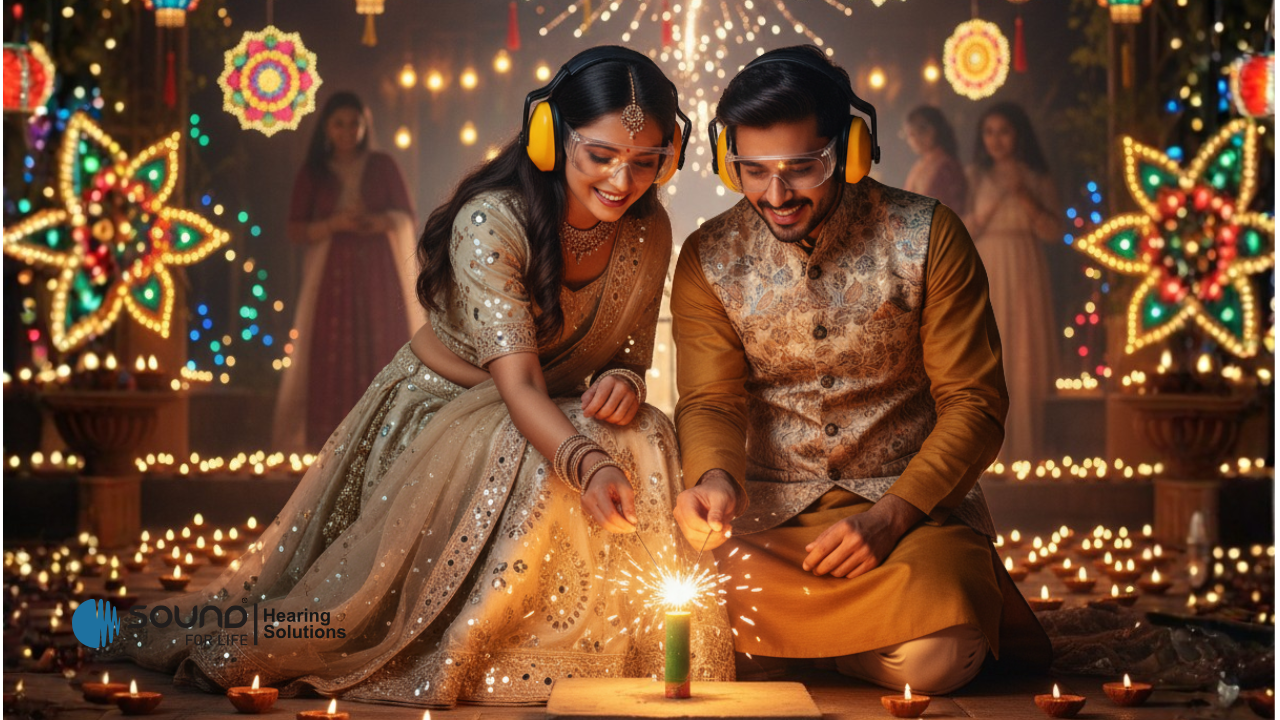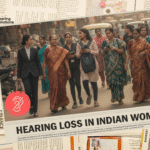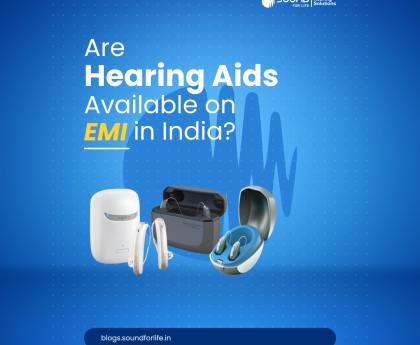Diwali, which is the festival of lights, is one of India’s most important holidays. It’s a time for family get-togethers, decorations, sweets, and, of course, fireworks. Cracking up crackers might make the celebrations more fun, but if you don’t take the right steps, it can pose a serious risk to your hearing. We at SFL Hearing Solutions care about your hearing and want you to enjoy Diwali safely.
In this blog, let us explore how firecrackers can hurt your hearing, the indicators that it can be damaged, how to avoid it, and what to do if you have hearing difficulties.
How Firecrackers Can Hurt Your Hearing
Firecrackers create sound waves that can get quite loud, up to 120 decibels. Even a short time of being around loud noise can damage your hearing permanently.
- Decibel Levels of Common Firecrackers:
- Sparklers: ~70 dB
- Small crackers (Chakri, Anars): 90–100 dB
- Loud crackers (Bombs, Rockets): 120–160 dB
- Sparklers: ~70 dB
Sounds that are louder than 85 dB might damage your hearing if you are around them for a long time. Loud firecrackers often go over this, which makes ears quite sensitive.
- Immediate Effects of Loud Noise:
- Ringing in the ears (tinnitus)
- Temporary hearing loss or muffled hearing
- Discomfort or pain in the ears
- Ringing in the ears (tinnitus)
- Long-Term Effects:
- Permanent hearing loss
- Chronic tinnitus
- Difficulty in understanding speech, especially in noisy environments
- Permanent hearing loss
Who is most at risk and why?
Some groups are more likely to get hearing impairment from loud noises:
- Children: Kids’ ears are more fragile than adults’ and they often don’t realise when a sound is too loud. Think of loud toys, headphones turned up high, school events or fireworks — what seems “fun” to a child can easily cause lasting damage. Parents and caregivers should supervise volume levels, choose age-appropriate ear protection for noisy situations, and teach children to take quiet breaks so their ears can recover.
- Older adults: As we age, the ear’s natural resilience declines, so older adults are more likely to suffer further damage from loud noise. Even a single very loud noise (like close fireworks or a sudden blast) can worsen existing age-related hearing loss. It helps to avoid noisy environments when possible, use ear protection at concerts or celebrations, and get routine hearing checks so any change can be caught early.
- Individuals with existing hearing problems: People who already have hearing difficulties, such as hearing loss or ear infections, need to be particularly careful as additional loud noise can accelerate damage and make everyday hearing even harder.
- Frequent firecracker users and people who spend long hours near loud noise: People who regularly burst firecrackers, work near heavy machinery, or spend hours in loud environments face two dangers: very high sudden peak sounds (which can injure the ear instantly) and cumulative exposure over time. Both add up. Simple steps like increasing distance from the source, limiting how long you’re exposed, and using good earplugs or earmuffs make a big difference in protecting long-term hearing.
Signs of Hearing Damage
It’s really important to notice early signs. Here are some symptoms that your ears may have been hurt:
- Ringing or buzzing in the ears (tinnitus)
- Difficulty understanding conversations
- Feeling of fullness in the ears
- Sensitivity to everyday sounds
- Temporary hearing loss after loud noise exposure
If any of these symptoms don’t go away, you should see a hearing professional right once.
How to Keep Your Ears Safe During Diwali
You don’t have to lose out on the fun to protect your hearing. Here are some safe ways to have fun during the festival:
1. Protect your ears
- Earplugs: Soft, disposable earplugs can cut down on noise by 15 to 30 dB.
- Noise-cancelling headphones are great for kids or older people who are around a lot of noise.
2. Keep a Safe Distance
- Stay at least 10 to 15 meters away from firecrackers, especially the noisy ones.
- Stay away from small areas where sound bounces around and gets louder.
3. Limit exposure period
- Short bursts of exposure are less harmful than prolonged contact.
- Encourage children to watch from a safe distance rather than standing too close.
4. Pick Firecrackers That Make Little Noise
- Choose crackers that are good for the environment and make less than 85 dB of noise.
- A lot of companies now make “silent crackers” that are safer for your hearing.
5. Avoid Earphones or Loud Music While Bursting Crackers
- When you use headphones or listen to loud music while fireworks are going off, you are exposed to extra noise, putting your hearing at more risk.
6. Keep your ears dry and healthy.
- Infections and moisture might make you more likely to have noise damage.
- Avoid inserting any foreign objects into your ears and consult a doctor if you experience any discomfort, pain or discharge.
Special Considerations for Children
Kids are naturally intrigued and might not know how dangerous firecrackers are.
Parents should:
- Make sure their kids use ear protection when there are fireworks.
- Keep them away from the noisy crackers.
- Teach kids about noise safety in a fun and easy way.
- Don’t allow kids to set off firecrackers by themselves.
What to Do After Being Exposed to Firecrackers
Some noise exposure is unavoidable, even with safeguards. If you feel any pain:
- Give Your Ears a Break: Don’t go to places that are too noisy for a day or two.
- Look for Symptoms: If you keep hearing ringing, muted sounds, or discomfort, you should see a doctor.
- Talk to a hearing specialist: Getting help early might stop lasting damage.
We at SFL Hearing Solutions offer expert hearing tests and custom solutions to keep your ears healthy.
Myths and Misconceptions
- “Hearing damage from firecrackers is only temporary.”
- That’s not true. Some damage is only transitory, but repeated exposure might cause permanent loss.
- “Earplugs are uncomfortable and not needed.”
- Earplugs made today are soft, easy to use, and very good at blocking out dangerous sounds.
- “Kids’ ears are tough.”
- Kids’ ears are really more sensitive than adults’. It’s important to take safety precautions.
Why it’s important to celebrate safely
Hearing is one of the most important senses, and once it is hurt, it can’t be totally healed. People may enjoy Diwali without hurting their ears in the long run if they are aware of how to do so.
- Taking care of your hearing also lowers the chances of tension, irritation, and trouble sleeping that can come from ringing in the ears.
- It shows kids and the community how to be responsible.
Have a safe and responsible Diwali this year. Use ear protection to keep your ears safe, and celebrate with care. Call SFL Hearing Solutions right away if you or someone you care about has hearing problems or wants a professional hearing check. Our professionals are ready to help you with personalised advice and solutions.
Celebrate wisely because your hearing is valuable!
Disclaimer: This article is primarily for educational purposes and should not be used as a substitute for professional medical advice. If you have hearing loss, tinnitus, or ear pain that doesn’t go away, please consult a qualified hearing specialist or ENT doctor.




